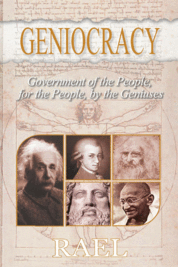Geniocracy

| A series of articles on the | |
.png) | |
Geniocracy is the framework for a system of government which was first proposed by Raël (leader of the International Raëlian Movement) in 1977 and which advocates problem-solving and creative intelligence as criteria for governance.[1]
Definition
The term geniocracy comes from the word 'Genius' and proposes a system that is designed to select for intelligence and compassion as the primary factors for governance. While having a democratic electoral apparatus, it differs from traditional liberal democracy by instead suggesting that candidates for office and the body electorate should meet a certain minimal criterion of problem-solving or creative intelligence. The thresholds proposed by the Raëlians are 50% above the mean for an electoral candidate and 10% above the mean for an elector.[1]
Justifying the method of selection
This method of selectivity is deliberate so as to address what the concept considers to be flaws in the current systems of democracy. The primary object of criticism is the inability of majoritarian consensus to provide a reasonable platform for intelligent decision making for the purpose of solving problems permanently. Geniocracy's criticism of this system is that the institutions of democracy become more concerned with appealing to popular consensus through emotive issues than they are in making long-term critical decisions, especially those that may involve issues not immediately relevant to the electorate. It asserts that political mandate is something far too important to simply leave to popularity, and asserts that the critical decision making required for government, especially in a world of globalization, cannot be based on criteria of emotive or popular decision making. In this respect, Geniocracy derides Liberal Democracy as a form of "Mediocracy".[1] In a geniocracy Earth would be ruled by a worldwide Geniocratic government.[2]
Agenda
| Raelian texts |
|---|
Part of the geniocratic agenda is to purport the idea of a world government system, deriding the current state-system as inadequate for dealing with contemporary global issues that are typical of globalisation, such as environmentalism, social justice, human rights, and the current economic system. In line with this, geniocracy proposes a different economic model called Economic Humanitarianism.[1]
Response to criticism
As a response to its controversial attitudes about selectivity one of the more general responses is to point out that universal suffrage, the current system, already discriminates to some degree and varyingly in different countries, in who is allowed to vote. Primarily, this discrimination is against minors, incarcerated felons, and the mentally incapacitated. This is on the basis that their ability to contribute to the decision making process is either flawed or invalid for the purpose of the society.
Status
| Part of the Politics series | ||||||||
| Basic forms of government | ||||||||
|---|---|---|---|---|---|---|---|---|
| Power structure | ||||||||
|
||||||||
| Power source | ||||||||
|
||||||||
| Power ideology | ||||||||
|
||||||||
| Politics portal | ||||||||
The current difficulty in the ideas of geniocracy is that the means of assessing intelligence are ill-defined. One idea offered by Raël in Geniocracy is to have specialists such as psychologists, neurologists, ethnologists, etc., perfect or choose among existing ones, a series of tests that would define each person's level of intelligence. They should be designed to measure intellectual potential rather than accumulation of knowledge.
Other components deemed necessary for a more rounded understanding of intelligence include concepts like emotional intelligence. As such, geniocracy's validity cannot really be assessed until better and more objective methods of intelligence assessment are made available.
The matter of confronting moral problems that may arise is not addressed in the book Geniocracy; many leaders may be deeply intelligent and charismatic (having both high emotional/social intelligence and IQ) according to current means of measuring such factors, but no current scientific tests are a reliable enough measure for one's ability to make humanitarian choices (although online tests such as those used by retail chains to select job applicants may be relevant).
The lack of scientific rigour necessary for inclusion of geniocracy as properly testable political ideology can be noted in number of modern and historical dictatorships as well as oligarchies. Because of the controversies surrounding geniocracy, Raël presents the idea as a classic utopia or provocative ideal and not necessarily a model that humanity will follow.[3]
Democratically defined regions
The author of Geniocracy recommends (though, does not necessitate) a world government with 12 regions. Inhabitants would vote for which region they want to be part of. After the regions are defined, they are further divided into 12 sectors after the same principle of democracy is applied. While sectors of the same region are defined as having equal numbers of inhabitants, the regions themselves may have different levels of population, which would be proportional to its voting power.[1]
See also
- Idiocracy, a dark comedy film depicting the United States in 2505 where the vast majority are mentally backwards (by current standards) despite widespread use of IQ tests.
- Plato's Republic
- Meritocracy
- Netocracy
- Noocracy
- Transhumanism
- Technocracy
References
Inline
- 1 2 3 4 5 Raël, Geniocracy. Nova Distribution, 2008.
- ↑ Sitting down with Raelians, awaiting aliens, South Florida Sun-Sentinel. 10 September 2001. Retrieved 6 October 2007. (highlight)
- ↑ Raelians and Cloning: Are They for Real?, Zenit News Agency. 16 January 2003. Retrieved 25 March 2007.
General
- Rael, La géniocratie. L'Edition du message, 1977. ISBN 2-88395-003-2.
- Rael, Geniocracy: Government of the People, for the People, by the Geniuses. Nova Distribution, 2008. ISBN 2-940252-19-X
Further reading
- Palmer, Susan J. (2004). "Geniocracy and the Raelians' Political Aspirations". Aliens Adored: Raël's UFO religion. Rutgers University Press. pp. 86–88. ISBN 0-8135-3476-3.
External links
- Geniocracy.org
- Geniocracy Review on RaelNews
- Geniocracy piece on RaelRadio
- 'Geniocracy is the solution' - article on Raelnews